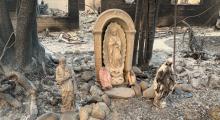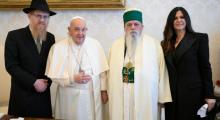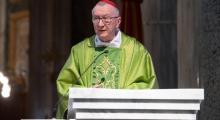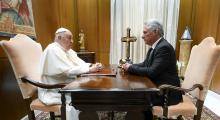Issued by the Catholic Center for Studies and Media - Jordan. Editor-in-chief Fr. Rif'at Bader - موقع أبونا abouna.org
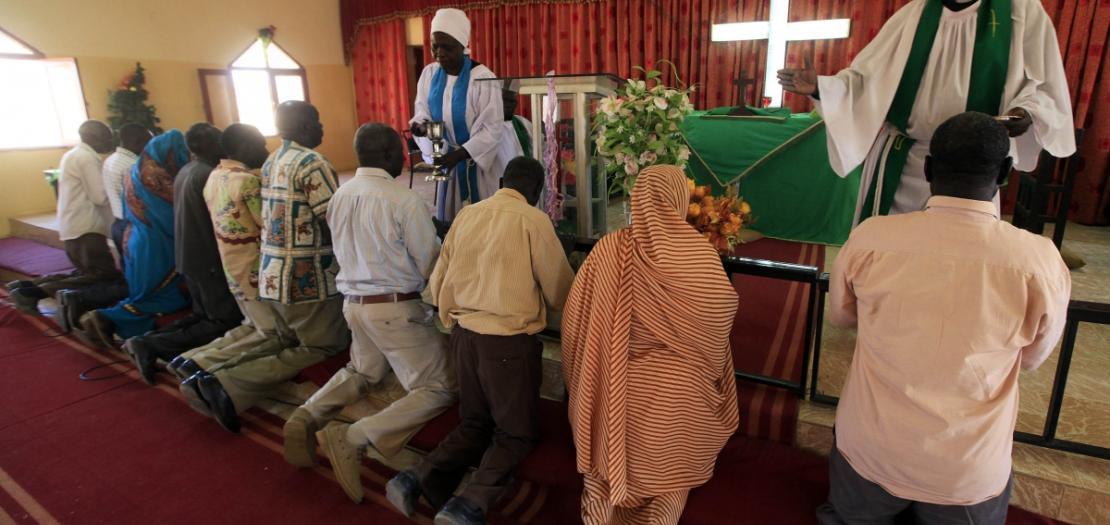
An attack on a Coptic Christian church during Holy Mass on Sunday, May 14, in the Sudanese capital of Khartoum is drawing attention to the plight of Christians in the northeastern African country, where a raging civil war is forcing out Christian clerics.
The attack on the Coptic Mar Girgis (St. George) Church in Omdurman, across the Nile River from the capital, came as church leaders in neighboring South Sudan are urging dioceses and parishes to open their doors to priests, nuns and other religious people fleeing the deadly violence.
“Many of our people and some clergy and religious have arrived at border points,” wrote Roman Catholic Archbishop Stephen Ameyu Martin Mulla of Juba, the capital of South Sudan, in a May 5 letter to all clergy, monks and nuns in Sudan. “It is also clearer now that some of the church structures in Sudan have been vandalized and destroyed.” He appealed to Catholics in his own country “to open your houses to receive your brother priests and religious.”
“The attack on the church is very unfortunate. We continue to urge the two sides to respect places of worship and avoid battles in civilian areas,” Francis Kuria Kagema, general secretary of the African Council of Religious Leaders, told Religion News Service. “We urge the two generals to accept ceasefire and agree to peace negotiations.”
Other churches have been damaged in the fighting. On April 24, two rockets struck the grounds of the Our Lady Queen of Africa, the Roman Catholic cathedral in El-Obeid, southwest of Khartoum. The blasts destroyed parts of the rectory and the cathedral’s main gate. After an April 17 attack on Khartoum’s All Saint’s Cathedral, the seat of the Anglican primate, soldiers from RSF occupied it and used it as a military base.
In early May 2023, another Coptic church was hit with a rocket, and an Evangelical Presbyterian church in Bahri, a Christian neighborhood of Khartoum, was set ablaze when a nearby munitions depot exploded.
An estimated 91 per cent of the 45.6 million population are Muslims, while Christians make up 5.4 per cent. About 2.8 per cent follow traditional religions, according to Pew Research Center.
Military regimes have targeted churches and arrested and imprisoned pastors and their followers in the past, but only the current war has convinced Christians and their leaders to leave the capital en masse, with many fleeing across the border to South Sudan or settling in relatively quiet areas of the country.
According to the Rev. John Gbemboyo Joseph Mbikoyezu, coordinator of the Sudan Catholic Bishops Conference, many people who have fled Khartoum and want to travel to Juba were stranded in Renk and Paloch, towns just inside South Sudan in the country’s northeast.
“They need to be connected to Juba or Malakal towns by boat. This is a 24-hour journey. The diocese (of Malakal) has a boat, but there is the challenge of fuel. The boat needs about nine drums. There is no fuel in the market. It is also very expensive,” said Fr. Mbikoyezu in an interview, who said many of Khartoum’s Christian clergy had already fled.


